Harvard Outreach Newsletter
113th Issue, January 2023
In this issue:
- Best thing about Harvard: making new friends!
- World university rankings 2023
- Which universities are ranked the highest for particular subjects?
- Standardized tests - should I still take them?
- Researching US colleges
- Parental support for students applying to university
Best thing about Harvard: making new friends!
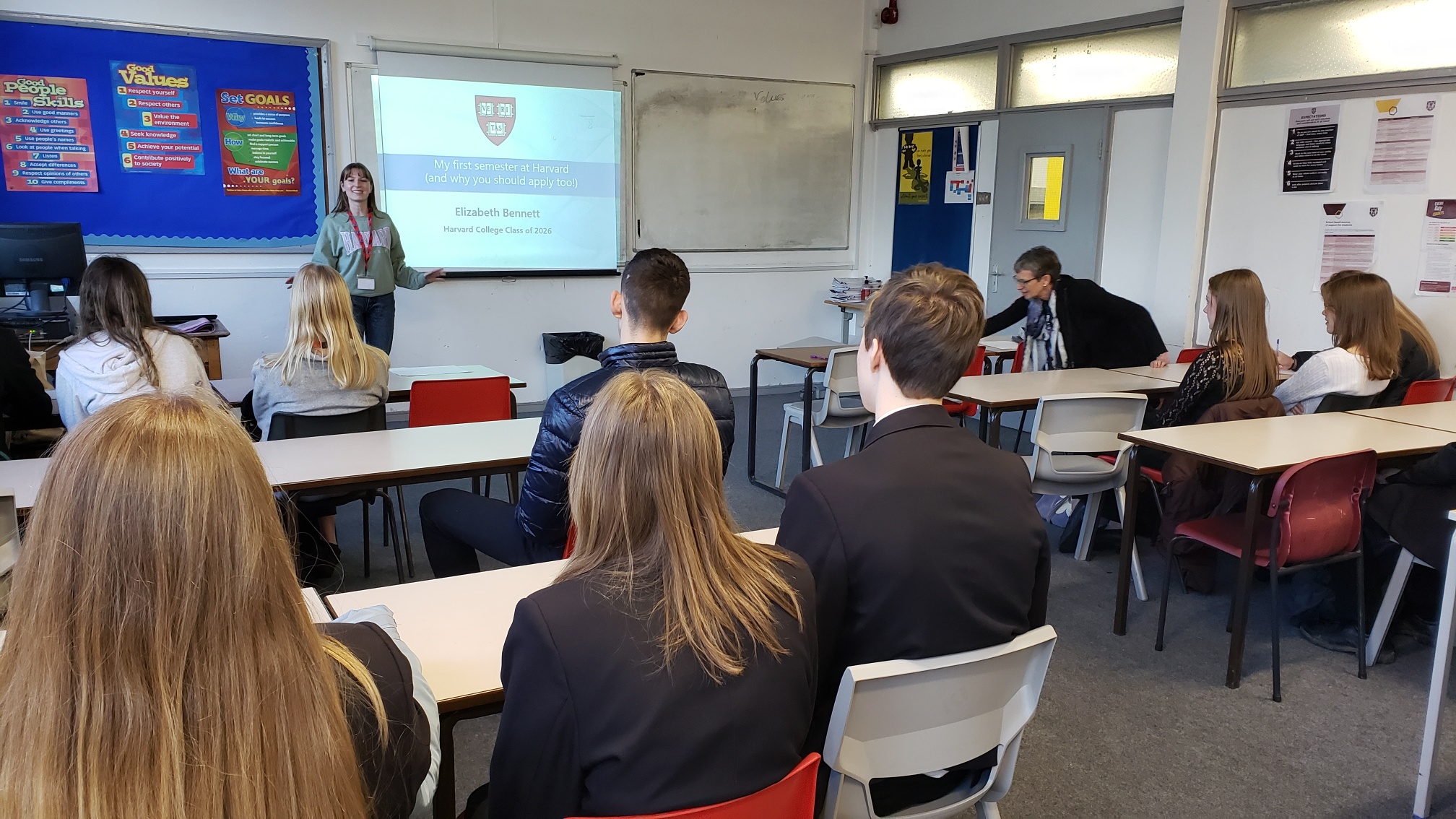
Most students from the UK who have started their first year at Harvard return home to their families during the January vacation. Brimming full of experiences from their first four months in a dynamic new environment, they can’t wait to tell the folks back home all about it.
As part of our outreach work, the Harvard Club of the UK encourages first-year students to visit their old high schools while they are back in the UK and give a presentation to current students who will be applying to university in a year or two. The talks can be extremely effective in inspiring them to apply to US colleges when they hear first-hand what a fantastic experience it has been, both socially and academically, from someone who went to the same high school as them.
Elizabeth Bennett, an alumna of King Edward VI High School, Morpeth, Northumberland, returned there on 11th January and gave a stimulating and informative talk to students in Years 11 and 12 (US 10th and 11th Grade) about her impressions of her first few weeks living on Harvard Yard.
Starting with the academic program, she loved the wide-ranging liberal arts degree offered at Harvard, where every student is encouraged to explore new subjects. “An amazing opportunity to try something new,” as she described it. Her favourite class so far has been California in the 60s, one of two first-year seminars she will take this year. Having been unable to continue with French after her GCSEs due to the specialist nature of A Levels in the UK, she was delighted to be able to take it up again at Harvard. Her other two classes in her first semester were Literature, and Music Theory (she is a talented musician and intends to major in Music).
Housing for undergraduate students is guaranteed on campus for all four years, and Elizabeth loves the fact that “…first-year dorms are right in the middle of campus, only minutes away from school buildings.” This enables her to fall out of bed five minutes before her first class!
Another plus for the accommodation was the effort made by the Harvard College Housing Officeto place first-year students with compatible roommates. All of the five students in her dorm are musicians: Elizabeth is a violinist, then there are two violists, one cellist, and one guitarist.
Not surprisingly, Elizabeth’s extracurricular activities are focused on music. She sings in the University Choir, which provides choral music for the Harvard Memorial Church and puts on concerts; and in the Harvard Choruses, made up of over 300 students singing in eight faculty-directed choral ensembles. She also plays violin in the pit orchestra of Harvard College Opera. If that weren’t enough, she is also starting up her own steel band!
But what is the best bit of Harvard overall? Elizabeth explains:
“It’s hard to choose my favourite thing about life at Harvard, as it really is everything I always hoped it would be. However, the thing that stands out to me the most is the sense of community and the wonderful friendships I have made. Even in only a few months, I have met so many amazing people who I know will be my friends for a very long time.”
World University Rankings 2023
At US College Fairs we are sometimes asked: ‘Is there a US equivalent to the Russell Group universities in the UK?’ The short answer is ‘no’, but if you want a rough comparison between the Russell Group (the top 24 UK research universities) and other world universities, then you should find out where they sit in the world university rankings.
Universities that appear in the same area of the tables are likely to be of a similar calibre – but you should be cautious about reading too much into this, because (1) the organisations that produce world rankings use different assessment criteria, so the ranking of a particular university can vary wildly between different tables; and (2) there are many other criteria besides world ranking (see article below on ‘Researching US Colleges’) that you should use to determine which colleges make it to your shortlist.
When carrying out your research, you should always remember that there is a right and wrong question to ask yourself when you are searching for suitable universities to which you might apply.
- The wrong question is: which are the best universities?
- The right question is: which universities are the best fit for my particular needs and interests?
If a particular US college or UK university satisfies all your requirements, then you should still apply regardless of its world ranking. Nevertheless, if you want to check where your US college shortlist sits in comparison to other universities both within and outside the UK, the two main world ranking sites are:
QS World University Rankings 2023 (US)
Times Higher Education World University Rankings 2023 (UK)
Most, but not all, Russell Group universities come within the top 150 in the world rankings, so a very rough rule of thumb is that any university that comes within that range will be on a par with the Russell Group. But do bear in mind that there are still many excellent colleges outside the top 150.
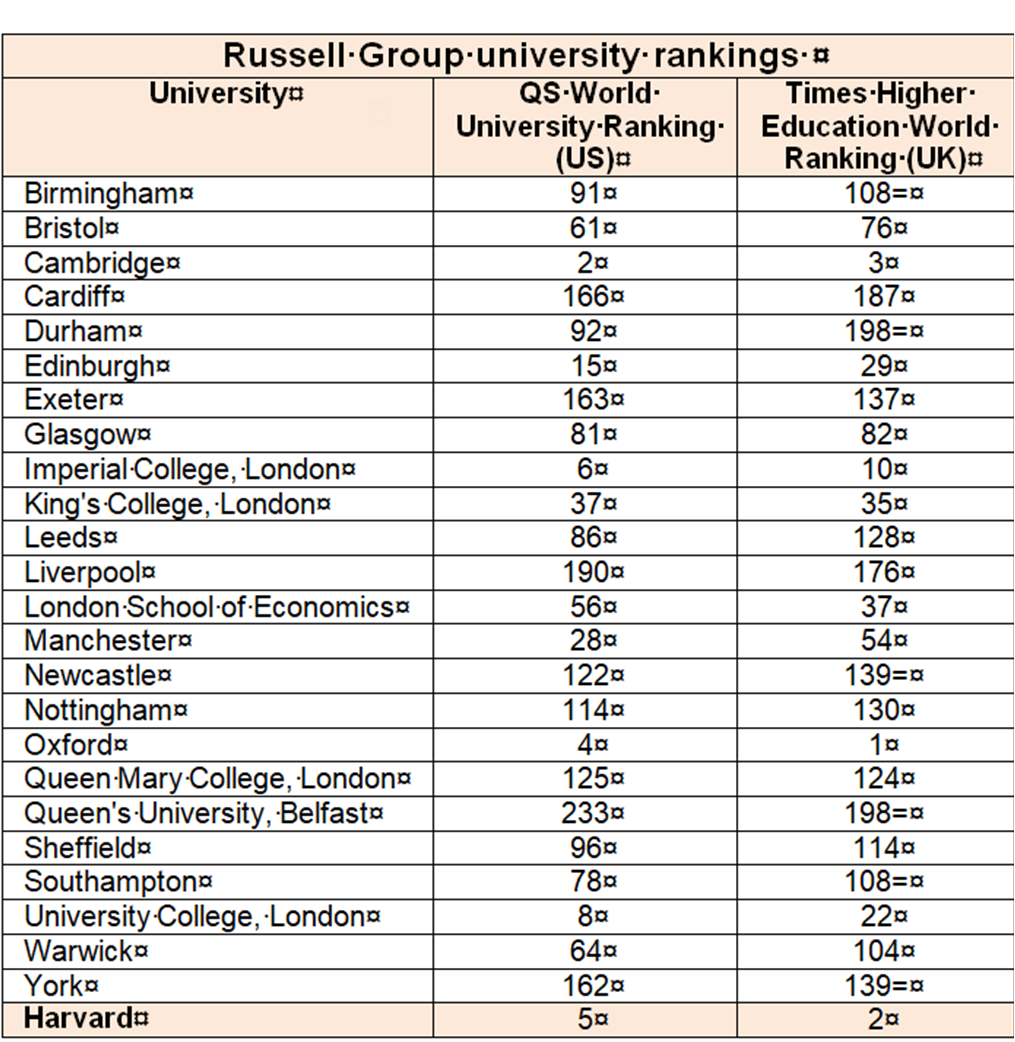
Which universities are ranked the highest for particular subjects?
QS World University Rankings also produces rankings by subject. In 2022 (the latest year for which figures are available), here are the universities which were ranked the highest in each subject, classified under five broad subject areas.
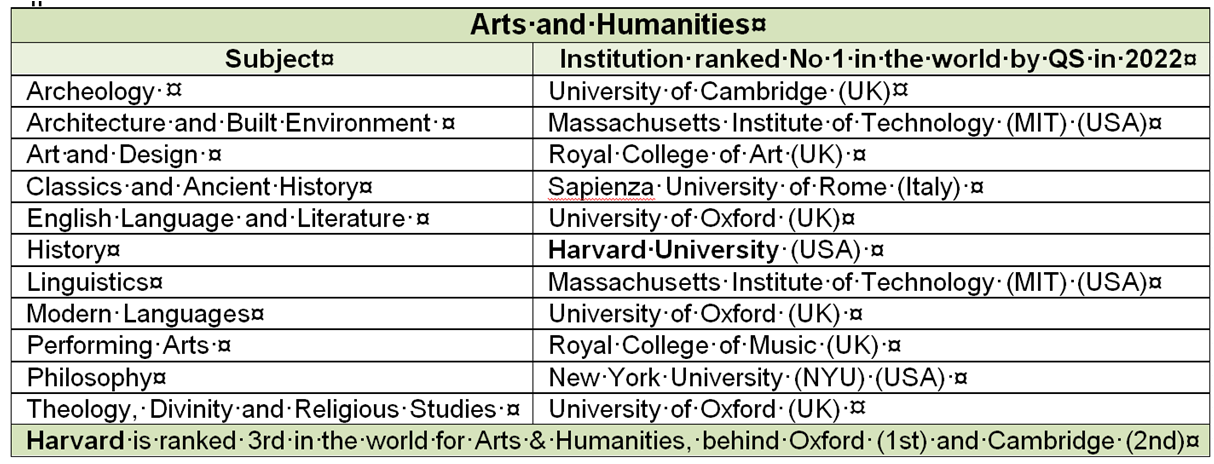


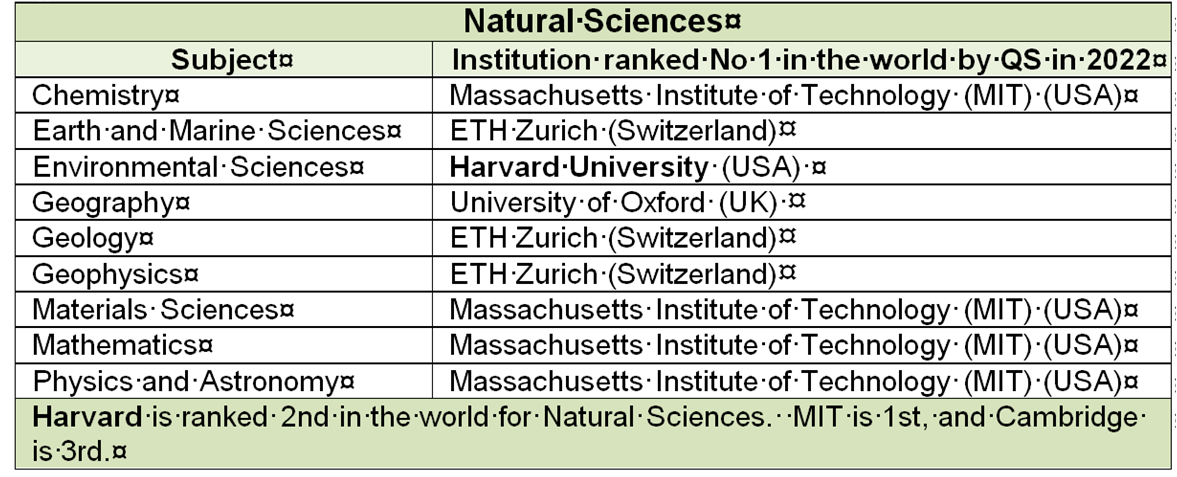
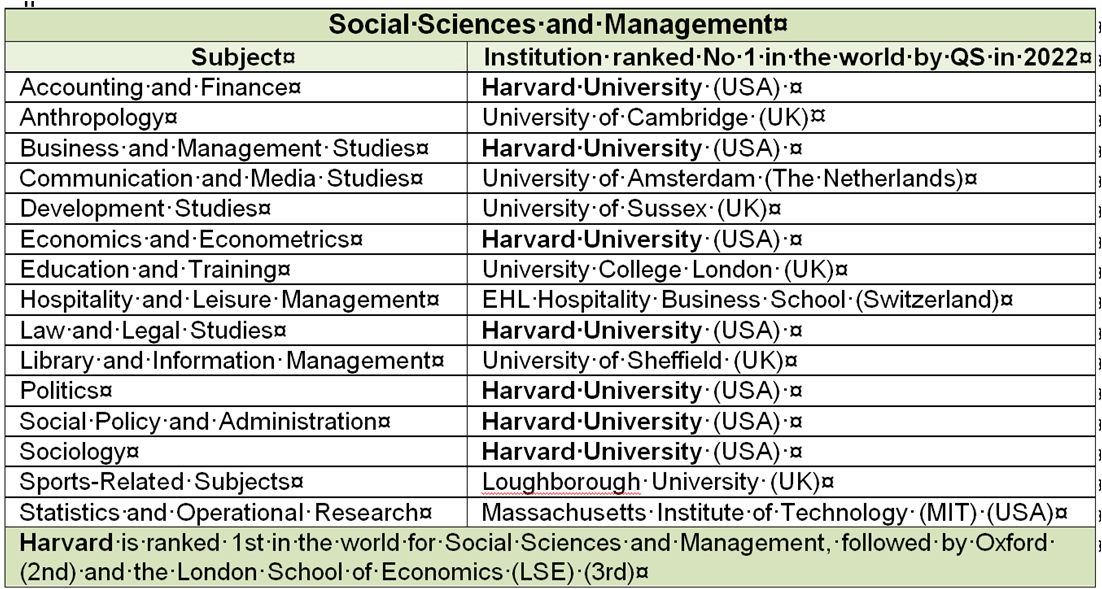
Standardized tests - should I still take them?
The SAT and ACT – the two standardized tests that for many years have been an important component of US college applications – are now optional at many US colleges, and some do not require them at all. The number of test optional colleges has been steadily increasing over the last decade or so, but since the Covid pandemic, when many test centres were closed, the numbers have risen dramatically.
According to FairTest, over 1,800 four-year colleges will not require standardized test scores for those applying in the autumn of 2023. Of those, over 1,700 are test optional, and over 80 are test free. Many colleges have indicated they will extend their test optional policies into 2024, and Harvard has announced that it will extend its optional policy until 2026. For a full list of test optional and test free colleges, see the FairTest website.
Bearing in mind the large proportion of colleges that no longer require the tests, the question arises: should I take them at all? There is no clear answer to this question, as it will depend on your own academic profile as well as the practicalities of finding a test centre within a reasonable distance of your home town. If you cannot reach a test centre, then the decision is made for you. Also, if you have gained top grades in all your high school exams across all subjects, your academic credentials are already firmly established and you will gain little or no additional advantage by taking the tests. You would be better off spending the time developing your interests outside the classroom to enhance your extracurricular profile.
But if your high schools grades are slightly lower than you would like, there may be advantage in taking the tests if you are able to get a ‘good’ score – defined as being at the top end of the range of scores typically achieved by admitted applicants, as stated on the websites of the colleges on your shortlist. You may also find that practising for the tests improves your performance generally in maths, English comprehension and writing. So, by all means take the tests if you think you can improve your academic profile by doing so.
Researching US Colleges
If you have recently submitted your applications to US colleges by the Regular Action deadline in early January, we wish you every success. You will receive the results of your applications at the end of March, and will have until 1st May to accept or reject any offers that you receive.
If you are not applying until the autumn of 2023, one of your essential tasks during this academic year is to research the US college system so that by the summer, you will have identified a shortlist of colleges to which you would like to apply. Vicky Leung, Harvard College Class of 1991 and President of the Harvard Club of the UK, has written an article on Tips for Researching US Colleges, which includes comments on her own experiences when she was faced with the same task. The main criteria that may influence your college choices are:
- Admissions requirements – how do your achievements compare with typical students who gain admission?
- Courses – what is your most likely major, and your desired balance between optional and required courses?
- Cost – which colleges provide financial aid for international students?
- Location – which part of the US do you wish to be based, and do you want to be in a city, suburban or rural environment?
- Size – do you prefer to be in a setting with just a few hundred students or a large campus with many thousands?
- Diversity – What is the proportion of women to men? International to American students? Black and minority ethnic students to white students?
- Extracurricular interests – do you have an extracurricular interest that you cannot possibly do without?
Click here to read the full article, which includes links to the main search engines you can use to find colleges which fit your particular preferences.
Parental support for students applying to university
Parents of students who will be applying to American universities next autumn will no doubt be wondering what kind of support they should be offering their offspring. Students who make successful applications to top US colleges are nearly always self-starters – they are highly motivated individuals who undertake all the necessary research and preparation to put themselves in the best possible position to put together a high quality application. Parental support is an important part of this endeavour – but you must be careful not to take over control of the process. Admissions Officers (AOs) will expect applicants to take the lead when researching different colleges and preparing their applications, as students who are unable or unwilling to take the initiative in this respect are unlikely to have the personal qualities the AOs are looking for. So what exactly is the best role for parents to take in the application process?
Lian Parsons, who works at Harvard’s Division of Continuing Education, wrote a useful blog in July 2022 discussing how involved parents should be in their children’s college applications and admissions. It covers the following four areas:
- What role should parents and guardians play in college admissions?
- How to support your child in the process.
- When do parents and guardians become too involved in the college admissions process?
- How do you strike the right balance?
You can read the full article on the Harvard Summer School website.
If you enjoyed reading this newsletter and wish to receive future newsletters, click here to subscribe.